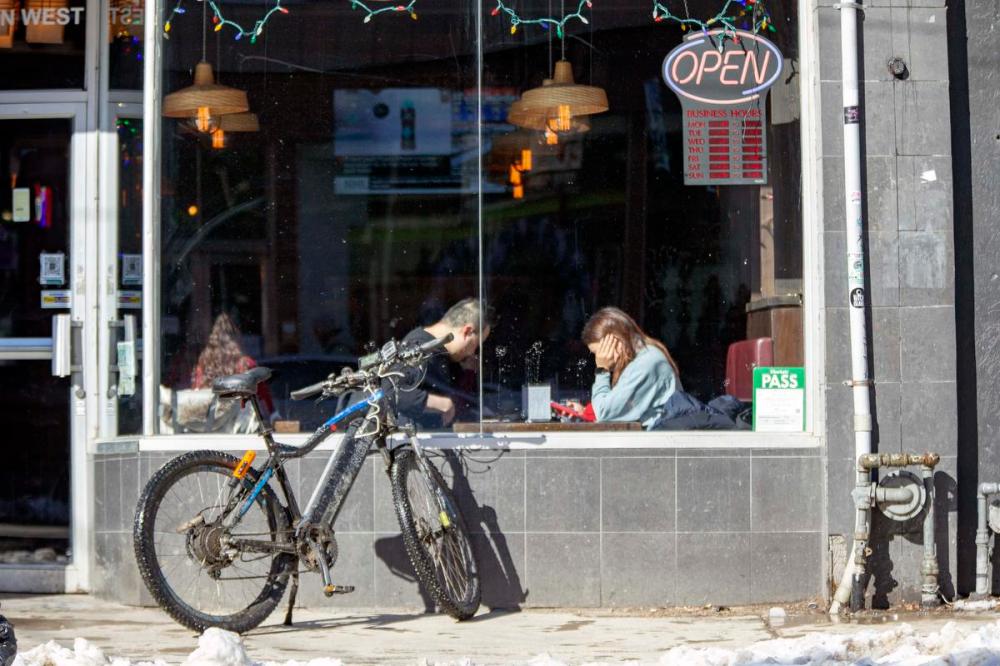Businesses still need help from Ontario as pandemic’s economic after-effects linger
Advertisement
Read this article for free:
or
Already have an account? Log in here »
To continue reading, please subscribe:
Monthly Digital Subscription
$1 per week for 24 weeks*
- Enjoy unlimited reading on winnipegfreepress.com
- Read the E-Edition, our digital replica newspaper
- Access News Break, our award-winning app
- Play interactive puzzles
*Billed as $4.00 plus GST every four weeks. After 24 weeks, price increases to the regular rate of $19.00 plus GST every four weeks. Offer available to new and qualified returning subscribers only. Cancel any time.
Monthly Digital Subscription
$4.75/week*
- Enjoy unlimited reading on winnipegfreepress.com
- Read the E-Edition, our digital replica newspaper
- Access News Break, our award-winning app
- Play interactive puzzles
*Billed as $19 plus GST every four weeks. Cancel any time.
To continue reading, please subscribe:
Add Free Press access to your Brandon Sun subscription for only an additional
$1 for the first 4 weeks*
*Your next subscription payment will increase by $1.00 and you will be charged $16.99 plus GST for four weeks. After four weeks, your payment will increase to $23.99 plus GST every four weeks.
Read unlimited articles for free today:
or
Already have an account? Log in here »
Hey there, time traveller!
This article was published 27/04/2022 (1268 days ago), so information in it may no longer be current.
Like an economic form of long COVID, the effects of two years of on and off lockdowns will linger after the global pandemic has ended.
That, say business groups, is the message they want to send to Ontario Premier Doug Ford and Finance Minister Peter Bethlenfalvy ahead of Thursday’s provincial budget, as well as to all parties before the provincial election campaign starts next week.
“When you have the premier and other government officials effectively saying day after day ‘If you go out you might be killing your neighbours,’ that leaves a scar. Just because the lockdowns are over doesn’t mean it’s business as usual again,” said Ryan Mallough, Ontario regional director of the Canadian Federation of Independent Business.

Small businesses have taken on an average of $166,000 in debt during COVID, and are facing a looming July 1 deadline to pay back provincial taxes and fees deferred during the pandemic. It would be a daunting prospect at the best of times and even more so when customers haven’t yet returned in droves, Mallough said.
“There’s no way some of them will be able to pay a lump sum. The cash flow just isn’t there right now,” said Mallough, noting that just 40 per cent of federation members say they’re at pre-COVID revenue levels.
The federation and other business groups are calling for the government to either forgive the deferred taxes or allow them to be paid in instalments.
“Many of the hardest hit restaurants will continue to struggle through the recovery period due to high levels of debt accrued over the pandemic, including these deferred payments,” said Restaurants Canada vice-president James Rilett in a prebudget submission to the government. “Restaurants Canada would like to work with the Ontario government to find a mechanism to identify the hardest hit businesses in need of continued support and convert these deferred payments into grants. This lowered debt will provide the operators some flexibility as they return to profitability.”
Another key demand of the Canadian Federation of Independent Business and other organizations, including Restaurants Canada, is government marketing campaigns to lure consumers back into shops, restaurants and bars.
Restaurants are also pushing for a cap on fees collected by delivery services such as Uber Eats and DoorDash, which can make up as much of 30 per cent of sales. The fees had temporarily been capped at 20 per cent while indoor dining was prohibited.
“After COVID-19 takeout and delivery sales continue to make up a much more important part of a restaurant’s sales mix … members are calling for this important recovery measure to be made permanent to allow restaurants a chance to recover and return to profitability in this new climate,” Rilett wrote.
Given ongoing labour shortages, business groups are also hoping their members will be more easily able to tap into government credits for on-the-job training and education.
Another key item on the wish list for Restaurants Canada is to be included in any discussions on the future of the Master Framework Agreement, which governs the relationship between the LCBO and the Beer Store. The current agreement expires in 2025. The government needs to give notice at least two years before the end of the agreement if it doesn’t intend to renew it.
The provincial government has already threatened to rip up the agreement, prompting the threat of a billion-dollar lawsuit from the Beer Store’s owners, including Molson Coors and Labatt, which together own 98 per cent of the company.
The Retail Council of Canada is also pushing for more changes in alcohol retailing.
“The party that wins the next mandate to govern in Ontario will oversee what could represent the largest change in the way alcohol is retailed in Ontario’s history. Our members look forward to participating in this move to modernization,” council spokesperson Michelle Wasylyshen said in an email.
Several measures — including stand-alone bottle shops and alcohol being delivered alongside food — were introduced during the pandemic and have since been made permanent.
Josh Rubin is a Toronto-based business reporter. Follow him on Twitter: @starbeer

